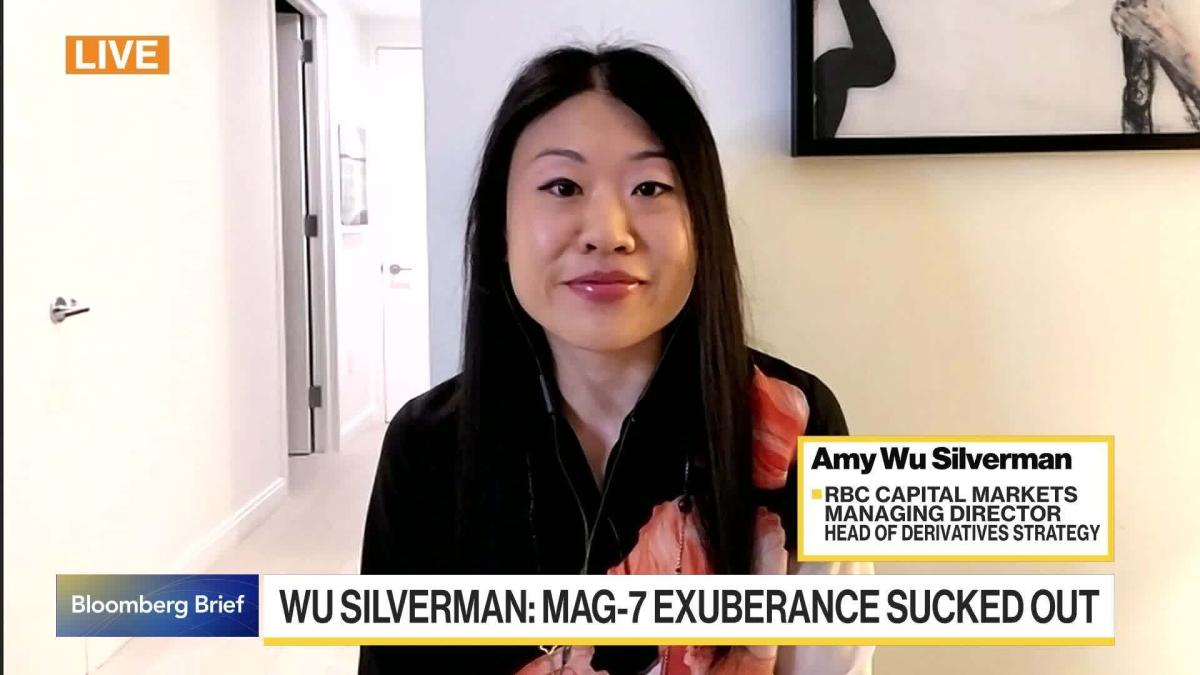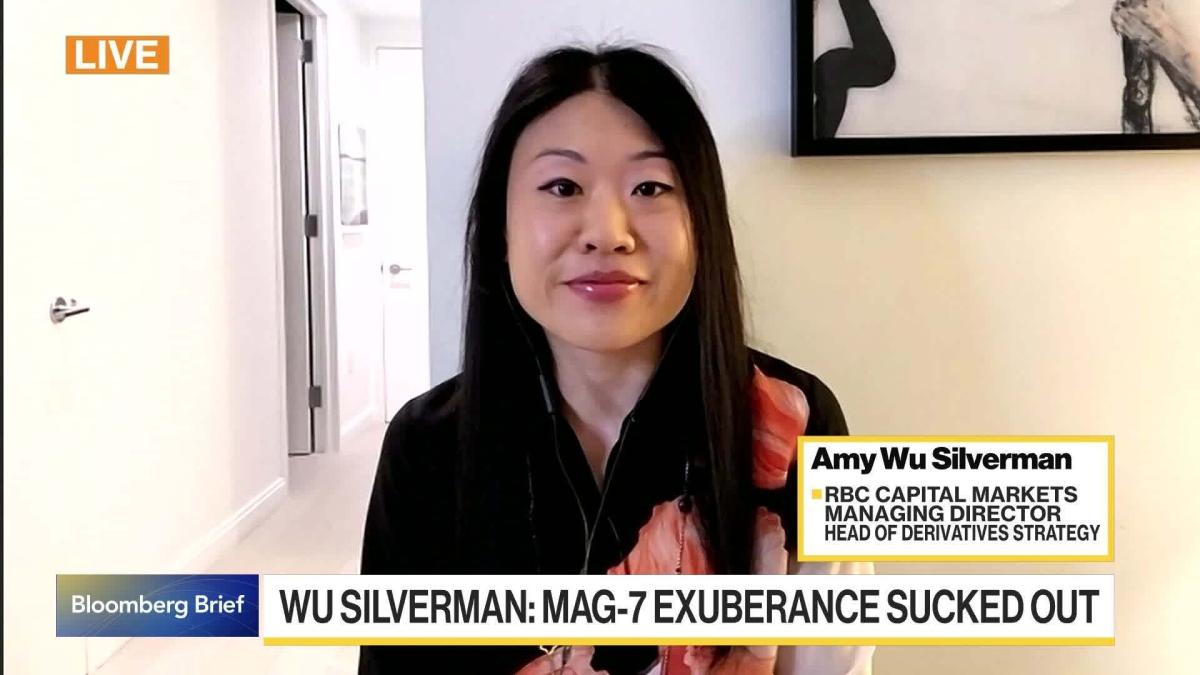
(Bloomberg) — Stocks tumbled after a disappointing start of the megacap earnings season fueled speculation the artificial-intelligence frenzy that has powered the bull market still needs to pay off.
Most Read from Bloomberg
A selloff in the world’s largest technology companies sent the S&P 500 toward its worst slide since the height of the regional-bank crisis in March 2023. Losses were more pronounced in the Nasdaq 100, which dropped 3%. Alphabet Inc. slumped 5% after sinking more resources into its drive to outmatch rivals in AI, fueling spending higher than analysts expected. Tesla Inc. plunged 10% after another profit miss and as it postponed the Robotaxi unveiling.
After driving the rally in stocks for most of 2024, big tech slammed into a wall. Traders rotated from megacaps to lagging parts of the market, spurred by bets on Federal Reserve rate cuts and concern the AI hype may be overblown.
“Investors are finally waking up to all that AI spend and realizing it is much more of an expense right now rather than a revenue generator,” said Peter Boockvar at The Boock Report.
For a fourth straight session — and the 10th time in 11 days — the performance of smaller companies exceeded that of their larger brethren, more evidence of investor tastes shifting away from the megacap tech names that have come to dominate benchmark indexes. The Russell 2000 is up 2.4% this week compared with a loss of 0.9% in the S&P 500 and 1.8% in the Nasdaq 100.
Treasury yields fell, with the move led by shorter maturities. Former New York Fed President William Dudley called for lower borrowing costs — preferably at next week’s gathering. For many analysts though, such a move would be worrisome as it would indicate officials rushing to avoid a recession.
The loonie wavered after the Bank of Canada cut rates — with the move focused on “downside risks.” The yen hit the highest since May amid an unwind in carry trades.
Steve Clayton, head of equity funds at Hargreaves Lansdown, said this could be the year markets start talking about the “So-So Seven,” noting that results from Tesla and Alphabet are not enough to maintain their momentum.
“The market is not impressed with the start of earnings season for the mega tech stocks,” said Kathleen Brooks, research director at XTB. “There was a lot resting on these results and we don’t think that they give clear answers to questions about the effectiveness and profit potential for AI right now.”
Broadly, second-quarter earnings season is off to a weaker start than usual.
Among S&P 500 companies that reported results, profits beat analyst estimates by the smallest margin since the end of 2022 while sales surprises were the worst in at least two years, data compiled by Bloomberg show.
Just as earnings roll in, a key technical indicator in the US stock market is looking stretched as it sits at historic extremes — a crucial gauge that has foretold past selloffs.
Known as the “the 200-DMA” — an abbreviation of 200-day moving average — the gauge measures how the S&P 500 is performing against that longer-term measure. At one point last week, the benchmark was trading as much as 15% above it, according to data compiled by Bloomberg.
Although that does not necessarily mean the market is about to tank, it is a warning sign for investors concerned about lofty tech valuations and concentration risk.
Corporate Highlights:
-
Texas Instruments Inc. provided a sales outlook that signals an inventory glut is coming to an end, reassuring investors that a revival is underway in key markets for the company’s chips.
-
AT&T Inc. added far more mobile-phone subscribers than Wall Street expected in the second quarter, with fewer customers canceling and many adding wireless service to their broadband plans.
-
Visa Inc. reported quarterly revenue that just missed Wall Street estimates — a rarity for the world’s biggest payments network.
-
Pfizer Inc.’s gene therapy for a severe bleeding disorder met its goal in a pivotal late-stage trial, paving the way for the company to enter what’s proven to be a challenging market for drug companies.
-
Deutsche Bank AG said it will most likely refrain from conducting a second share buyback this year, after suffering its first quarterly loss in four years.
-
Kering SA warned that its profit is set to tumble in the second half of the year as luxury demand cools and turnaround efforts at Gucci, its biggest brand, continue to sputter.
-
Renault SA reported its highest-ever profitability in the first half as the automaker benefited from lower raw-material prices and robust demand for more expensive sport utility vehicles like the Austral and Espace.
-
Blackstone Mortgage Trust Inc., which provides financing for commercial real estate, is cutting its dividend by 24% as defaults increase and borrowers struggle to make payments or refinance their loans.
-
CrowdStrike Holdings Inc., the cybersecurity company at the center of massive global IT outages, said that a bug in a safety mechanism allowed flawed data to go out to customers in a botched update, causing last week’s meltdown.
Key events this week:
-
Germany IFO business climate, Thursday
-
US GDP, initial jobless claims, durable goods, Thursday
-
US personal income, PCE, consumer sentiment, Friday
Some of the main moves in markets:
Stocks
-
The S&P 500 fell 1.8% as of 12:40 p.m. New York time
-
The Nasdaq 100 fell 3%
-
The Dow Jones Industrial Average fell 0.8%
-
The MSCI World Index fell 1.4%
Currencies
-
The Bloomberg Dollar Spot Index fell 0.2%
-
The euro was little changed at $1.0848
-
The British pound rose 0.1% to $1.2923
-
The Japanese yen rose 1.3% to 153.58 per dollar
Cryptocurrencies
-
Bitcoin rose 0.7% to $66,345.01
-
Ether fell 1.8% to $3,420.66
Bonds
-
The yield on 10-year Treasuries declined two basis points to 4.23%
-
Germany’s 10-year yield was little changed at 2.44%
-
Britain’s 10-year yield advanced three basis points to 4.16%
Commodities
-
West Texas Intermediate crude rose 1.2% to $77.90 a barrel
-
Spot gold rose 0.4% to $2,420.07 an ounce
This story was produced with the assistance of Bloomberg Automation.
–With assistance from Lu Wang, Jessica Menton, Sagarika Jaisinghani, Joel Leon, Alex Nicholson, Julien Ponthus and Aya Wagatsuma.
Most Read from Bloomberg Businessweek
©2024 Bloomberg L.P.
EMEA Tribune is not involved in this news article, it is taken from our partners and or from the News Agencies. Copyright and Credit go to the News Agencies, email news@emeatribune.com Follow our WhatsApp verified Channel





